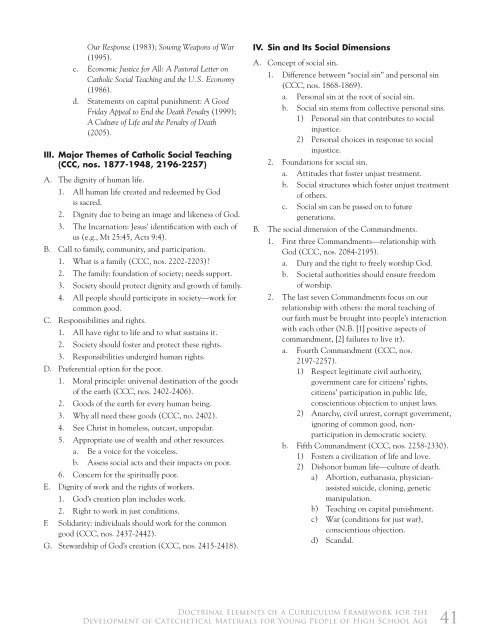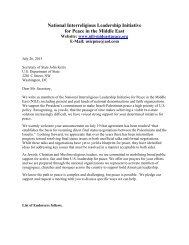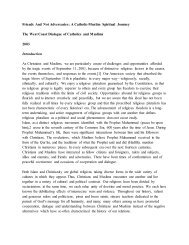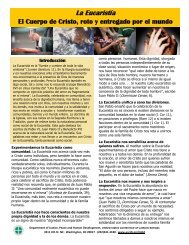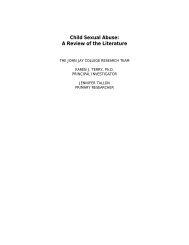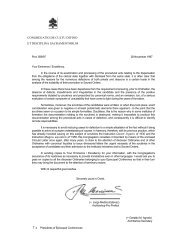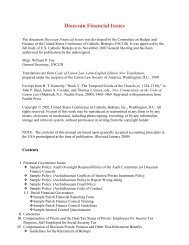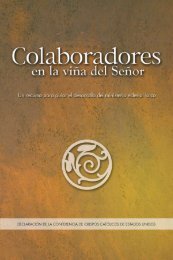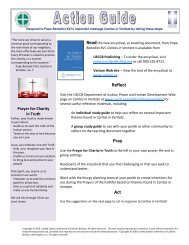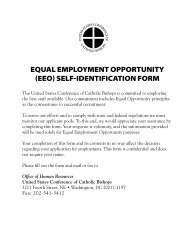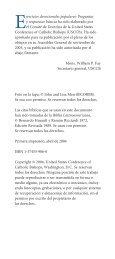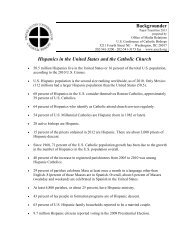Doctrinal Elements of a Curriculum Framework for the Development ...
Doctrinal Elements of a Curriculum Framework for the Development ...
Doctrinal Elements of a Curriculum Framework for the Development ...
- No tags were found...
You also want an ePaper? Increase the reach of your titles
YUMPU automatically turns print PDFs into web optimized ePapers that Google loves.
Our Response (1983); Sowing Weapons <strong>of</strong> War(1995).c. Economic Justice <strong>for</strong> All: A Pastoral Letter onCatholic Social Teaching and <strong>the</strong> U.S. Economy(1986).d. Statements on capital punishment: A GoodFriday Appeal to End <strong>the</strong> Death Penalty (1999);A Culture <strong>of</strong> Life and <strong>the</strong> Penalty <strong>of</strong> Death(2005).III. Major Themes <strong>of</strong> Catholic Social Teaching(CCC, nos. 1877-1948, 2196-2257)A. The dignity <strong>of</strong> human life.1. All human life created and redeemed by Godis sacred.2. Dignity due to being an image and likeness <strong>of</strong> God.3. The Incarnation: Jesus’ identification with each <strong>of</strong>us (e.g., Mt 25:45, Acts 9:4).B. Call to family, community, and participation.1. What is a family (CCC, nos. 2202-2203)?2. The family: foundation <strong>of</strong> society; needs support.3. Society should protect dignity and growth <strong>of</strong> family.4. All people should participate in society—work <strong>for</strong>common good.C. Responsibilities and rights.1. All have right to life and to what sustains it.2. Society should foster and protect <strong>the</strong>se rights.3. Responsibilities undergird human rights.D. Preferential option <strong>for</strong> <strong>the</strong> poor.1. Moral principle: universal destination <strong>of</strong> <strong>the</strong> goods<strong>of</strong> <strong>the</strong> earth (CCC, nos. 2402-2406).2. Goods <strong>of</strong> <strong>the</strong> earth <strong>for</strong> every human being.3. Why all need <strong>the</strong>se goods (CCC, no. 2402).4. See Christ in homeless, outcast, unpopular.5. Appropriate use <strong>of</strong> wealth and o<strong>the</strong>r resources.a. Be a voice <strong>for</strong> <strong>the</strong> voiceless.b. Assess social acts and <strong>the</strong>ir impacts on poor.6. Concern <strong>for</strong> <strong>the</strong> spiritually poor.E. Dignity <strong>of</strong> work and <strong>the</strong> rights <strong>of</strong> workers.1. God’s creation plan includes work.2. Right to work in just conditions.F. Solidarity: individuals should work <strong>for</strong> <strong>the</strong> commongood (CCC, nos. 2437-2442).G. Stewardship <strong>of</strong> God’s creation (CCC, nos. 2415-2418).IV. Sin and Its Social DimensionsA. Concept <strong>of</strong> social sin.1. Difference between “social sin” and personal sin(CCC, nos. 1868-1869).a. Personal sin at <strong>the</strong> root <strong>of</strong> social sin.b. Social sin stems from collective personal sins.1) Personal sin that contributes to socialinjustice.2) Personal choices in response to socialinjustice.2. Foundations <strong>for</strong> social sin.a. Attitudes that foster unjust treatment.b. Social structures which foster unjust treatment<strong>of</strong> o<strong>the</strong>rs.c. Social sin can be passed on to futuregenerations.B. The social dimension <strong>of</strong> <strong>the</strong> Commandments.1. First three Commandments—relationship withGod (CCC, nos. 2084-2195).a. Duty and <strong>the</strong> right to freely worship God.b. Societal authorities should ensure freedom<strong>of</strong> worship.2. The last seven Commandments focus on ourrelationship with o<strong>the</strong>rs: <strong>the</strong> moral teaching <strong>of</strong>our faith must be brought into people’s interactionwith each o<strong>the</strong>r (N.B. [1] positive aspects <strong>of</strong>commandment, [2] failures to live it).a. Fourth Commandment (CCC, nos.2197-2257).1) Respect legitimate civil authority,government care <strong>for</strong> citizens’ rights,citizens’ participation in public life,conscientious objection to unjust laws.2) Anarchy, civil unrest, corrupt government,ignoring <strong>of</strong> common good, nonparticipationin democratic society.b. Fifth Commandment (CCC, nos. 2258-2330).1) Fosters a civilization <strong>of</strong> life and love.2) Dishonor human life—culture <strong>of</strong> death.a) Abortion, euthanasia, physicianassistedsuicide, cloning, geneticmanipulation.b) Teaching on capital punishment.c) War (conditions <strong>for</strong> just war),conscientious objection.d) Scandal.<strong>Doctrinal</strong> <strong>Elements</strong> <strong>of</strong> a <strong>Curriculum</strong> <strong>Framework</strong> <strong>for</strong> <strong>the</strong><strong>Development</strong> <strong>of</strong> Catechetical Materials <strong>for</strong> Young People <strong>of</strong> High School Age41


